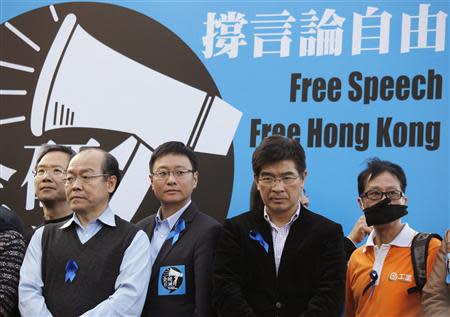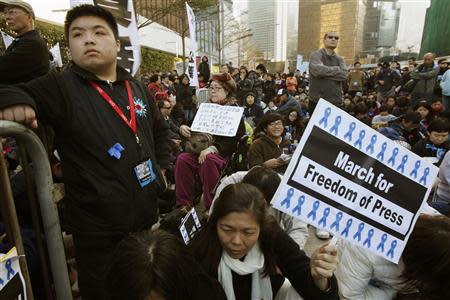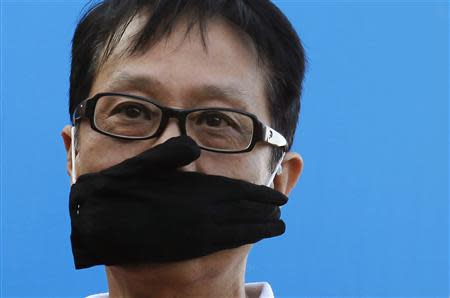Thousands march in Hong Kong against erosion of media freedoms
By James Pomfret HONG KONG (Reuters) - Thousands rallied outside Hong Kong's government headquarters on Sunday demanding the city's leader uphold media freedoms amid growing anger towards perceived behind-the-scenes intrusions on local media outlets. Tensions have been rising between forces backing democratic institutions in Hong Kong and China's Communist Party leaders as the city proceeds with political reforms that could lead to an unprecedented direct election for its next leader in 2017. Carrying "Free Speech, Free Hong Kong" banners, some 6,000 protesters including working journalists, demanded Hong Kong protect media freedoms as a core value underpinning the financial hub's success and global reputation. In recent years, Hong Kong journalist and rights groups have warned of mainland Chinese propaganda officials influencing local newsrooms, deepening ties between Hong Kong media bosses and Beijing, greater censorship, and the dismissal of influential liberal journalists. "Hong Kong has changed," one protester shouted into a loudhailer. "The air of freedom is becoming a lot thinner." Hong Kong, a former British colony that returned to Chinese rule in 1997, is a freewheeling capitalist hub which enjoys a high degree of autonomy and freedom, but Beijing's Communist Party leaders have resisted public pressure for full democracy. Beijing has agreed in principle for the city to hold direct elections in 2017, but no specific rules have yet been set on whether open nominations for candidates will be allowed. The media's concerns reflect in part what some see as Beijing's attempts to tighten control over Hong Kong amid its fears a pro-democracy candidate may win the 2017 election. A local government spokesman said the city's leader, Leung Chun-ying local, "attached great importance to Hong Kong's freedom of the press and freedom of speech". But democracy activists denounce him as a loyalist to Beijing's Communist leadership. Activists cite as examples of erosion of press freedom the dismissal of a popular radio talkshow host opposed to the local government. Staff at the Ming Pao newspaper, known for independent reporting critical of China, have criticized the appointment of an editor with suspected pro-Beijing leanings. "I have been in this industry for 30 years. I would say this is the worst time," said Shirley Yam, vice-chairman of the Hong Kong Journalists Association and organizer of the protest. She said press freedom "has been significantly compromised. Interviews were barred, photos were edited, columnists were sacked for all kinds of reasons". While Hong Kong's media outlets remain a beacon of freedom compared to those in mainland China, subject to heavy censorship and control from Communist Party leaders, the media have taken a softer line on reporting on China since 1997. (Additional reporting by Joyce Woo; Editing by Ron Popeski)



